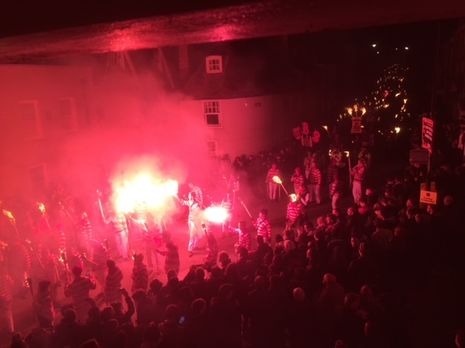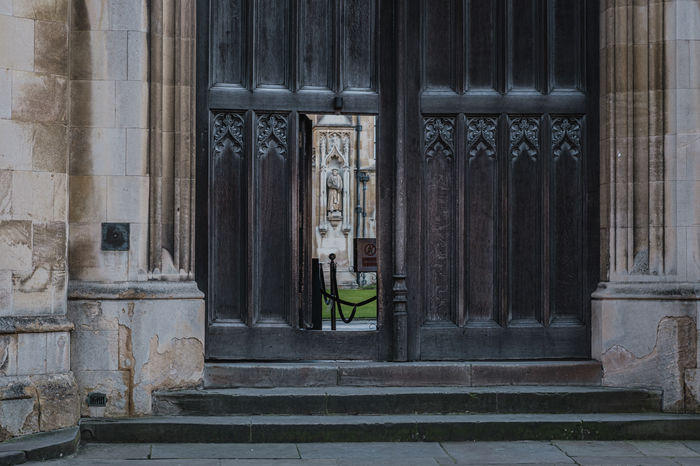Tradition and cultural appropriation in the ‘Bonfire Capital of the World’
Francesca Fairhead reflects on living in the ‘Bonfire Capital of the World’, Lewes in Sussex, and how she feels about the town’s long held traditions

Content note: this article contains descriptions and discussions of racism and blackface
Growing up in Lewes, a small and, seemingly, very normal town in Sussex, the 5th of November has always been a date highlighted in my calendar. It’s seen by many of my friends as more exciting, and indeed more important, than Christmas. Known as the ‘Bonfire Capital of the World’, Lewes hosts upwards of 60,000 spectators a year who come to watch the bizarre parades, fireworks, and traditions that have been running for over a century.
There is a central procession where the town’s own seven major ‘Bonfire societies’, alongside twenty-five to thirty smaller societies from surrounding villages, march with giant effigies of ‘enemies of the Bonfire’: locally, nationally, and internationally loathed political figures that are then blown up and burnt on each society’s towering fire. Yearly, around 6000 Lewes residents march in the parades in groups with different costumes, all carrying burning torches and throwing rook scarers to the floor where they explode with a deafening bang. Most dress as ‘smugglers’, donning striped jumpers with bandanas protecting their lungs from the smoke. Other groups include ‘The Monks’, who throw burning crosses into the river to commemorate Lewes’s seventeen protestant martyrs, ‘The Suffragettes’ brandishing huge banners, ‘The Romans’ in chariots as well as ‘The Pirates’, and ‘The Vikings’.
“The costumes come from the past [...] and they should have been left there”
As a child, I loved Bonfire — it was the most exciting night of the year and made me proud to be a part of a party town, united by a dangerous, fiery event. Yet as I’ve gotten older, I’ve grown increasingly uncomfortable with the problematic overtones that overshadow some of the night, to the point where I’m wondering if I should even attend this year. Even though much of the event is an enjoyable safe space, the question is whether I wish to avoid attending an event that is associated with a racist past and breakouts of racist incidents, even as it continues to improve.
I suppose the problematic aspects, for me, begin with the inherently anti-Catholic nature of the celebration, intensified in Lewes by the monk costumes and burning of crosses. More shocking, however, are some of the costumes which surpass appropriation and fall straight into the category of outright racism. The news linked to Lewes Bonfire is flooded with stories of intolerance around costume and effigy decisions. In 2003, twelve were arrested on charges of race hate in the nearby village of Firle for burning an effigy of a Romani caravan, a disgusting display of racism.
In Lewes itself, Borough (one of the seven central Societies), is in a constant battle with members who refuse to stop dressing as Zulus and blackening their faces. It took until 2017 for any kind of ban on this to be introduced; now, one cannot paint over half of their face black. Despite this, in 2018, a 6-year-old made the news for having marched in blackface in one of the town’s smaller parades which take place in the weeks leading up to the 5th. Each year, Commercial Square Society, another bonfire society, is led by people dressed as Native Americans. The costumes come from the past, from a time before the widespread reckoning with the problems of cultural appropriation — and they should have been left there.
When hearing these stories and watching the parades, full of anger at those who decide to dress in these costumes, there is a part of me that feels the whole event should be forgotten; it seems so outdated and steeped in problems that it surpasses forgiveness. But it is not that simple.
It’s hard, as I have found since coming to university, to explain to someone who isn’t from Lewes the importance that Bonfire has to the town. Despite being from Lewes I have never ‘marched’ in the parade, never been a member of a Society, yet even I feel a weird sense of pride in being part of the town. There is a sense of community and warm tradition among all who celebrate the event in a respectful manner, and there are many who do. But Bonfire isn’t for me. In a way, I am a visitor, someone who returns from university every year on the 5th of November to watch the parades.
Bonfire is for the people who have lived in Lewes all their lives, who fundraise year-round going door-to-door dressed as pirates or smugglers, spending whole days of October making torches one by one. Bonfire tradition is so deeply entrenched that there forms a strange disconnect between every day, where the majority of those who march would never dream of wearing such elaborate costumes, and Bonfire, when allowances are made. Attempts to alter costumes are met, to quote The Guardian, with ‘diehard bonfire enthusiasts’ claiming that campaigners ‘are trying to wreck their traditions’.
“Perhaps what Lewes needs to do as a town, is to address its past”
I am not saying that Lewes Bonfire is acceptable as it is, and I certainly don’t want to make excuses for it. The extent of the racism and intolerance ingrained in its history and still present today is truly sickening. However, to ban Bonfire entirely would remove a huge part of what it means to be from Lewes and would change the identity of the town forever. It would also do a disservice to the people who are trying to make change.
That said, the current extent of the problems of Lewes Bonfire does damage Lewes itself. Perhaps what Lewes needs to do as a town is to address its past: changing tradition doesn’t mean the need to rid the town of Bonfire night altogether; traditions can be changed without ruining authenticity and I believe Bonfire societies need to update theirs to make the 5th of November something everyone in my town can be proud of.
 News / Colleges charge different rents for the same Castle Street accommodation2 March 2026
News / Colleges charge different rents for the same Castle Street accommodation2 March 2026 News / King’s hosts open iftar for Ramadan3 March 2026
News / King’s hosts open iftar for Ramadan3 March 2026 Theatre / Lunatics and leisure centres 4 March 2026
Theatre / Lunatics and leisure centres 4 March 2026 News / Angela Merkel among Cambridge honorary degree nominees27 February 2026
News / Angela Merkel among Cambridge honorary degree nominees27 February 2026 News / News in Brief: waterworks, wine woes, and workplace wins 1 March 2026
News / News in Brief: waterworks, wine woes, and workplace wins 1 March 2026









